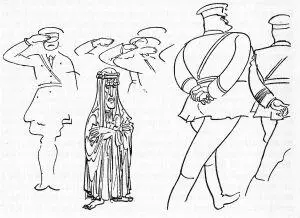At Cairo my sandalled feet slip-slapped up the quiet Savoy corridors to Clayton, who habitually cut the lunch hour to cope with his thronging work. As I entered he glanced up from his desk with a muttered 'Mush fadi' (Anglo-Egyptian for 'engaged') but I spoke and got a surprised welcome. In Suez the night before I had scribbled a short report; so we had to talk only of what needed doing. Before the hour ended, the Admiral rang up to say that the Dufferin was loading flour for her emergency trip.

Clayton drew sixteen thousand pounds in gold and got an escort to take it to Suez by the three o'clock train. This was urgent, that Nasir might be able to meet his debts. The notes we had issued at Bair, Jefer and Guweira were pencilled promises, on army telegraph forms, to pay so much to bearer in Akaba. It was a great system, but no one had dared issue notes before in Arabia, because the Beduins had neither pockets in their shirts nor strong-rooms in their tents, and notes could not be buried for safety. So there was an unconquerable prejudice against them, and for our good name it was essential that they be early redeemed.
Afterwards, in the hotel, I tried to find clothes less publicly exciting than my Arab get-up; but the moths had corrupted all my former store, and it was three days before I became normally ill-dressed.
Meanwhile I heard of Allenby's excellence, and of the last tragedy of Murray, that second attack on Gaza, which London forced on one too weak or too politic to resist; and how we went into it, everybody, generals and staff-officers, even soldiers, convinced that we should lose. Five thousand eight hundred was the casualty bill. They said Allenby was getting armies of fresh men, and hundreds of guns, and all would be different.
Before I was clothed the Commander-in-Chief sent for me, curiously. In my report, thinking of Saladin and Abu Obeida, I had stressed the strategic importance of the eastern tribes of Syria, and their proper use as a threat to the communications of Jerusalem. This jumped with his ambitions, and he wanted to weigh me.
It was a comic interview, for Allenby was physically large and confident, and morally so great that the comprehension of our littleness came slow to him. He sat in his chair looking at me--not straight, as his custom was, but sideways, puzzled. He was newly from France, where for years he had been a tooth of the great machine grinding the enemy. He was full of Western ideas of gun power and weight--the worst training for our war--but, as a cavalryman, was already half persuaded to throw up the new school, in this different world of Asia, and accompany Dawnay and Chetwode along the worn road of manoeuvre and movement; yet he was hardly prepared for anything so odd as myself--a little bare-footed silk-skirted man offering to hobble the enemy by his preaching if given stores and arms and a fund of two hundred thousand sovereigns to convince and control his converts.
Allenby could not make out how much was genuine performer and how much charlatan. The problem was working behind his eyes, and I left him unhelped to solve it. He did not ask many questions, nor talk much, but studied the map and listened to my unfolding of Eastern Syria and its inhabitants. At the end he put up his chin and said quite directly, Well, I will do for you what I can', and that ended it. I was not sure how far I had caught him; but we learned gradually that he meant exactly what he said; and that what General Allenby could do was enough for his very greediest servant.
Table of Contents
Upon Clayton I opened myself completely. Akaba had been taken on my plan by my effort. The cost of it had fallen on my brains and nerves. There was much more I felt inclined to do, and capable of doing:--if he thought I had earned the right to be my own master. The Arabs said that each man believed his ticks to be gazelles: I did, fervently.
Clayton agreed they were spirited and profitable ticks; but objected that actual command could not be given to an officer junior to the rest. He suggested Joyce as commanding officer at Akaba: a notion which suited me perfectly. Joyce was a man in whom one could rest against the world: a serene, unchanging, comfortable spirit. His mind, like a pastoral landscape, had four corners to its view: cared-for, friendly, limited, displayed.
He had won golden opinions at Rabegh and Wejh, practising that very labour of building up an army and a base, which would be necessary at Akaba. Clayton-like, he was a good cartilage to set between opposing joints, but he had more laughter than Clayton, being broad and Irish and much over six feet in height. His nature was to be devoted to the nearest job without straining on his toes after longer horizons. Also, he was more patient than any recorded archangel, and only smiled that jolly smile of his whenever I came in with revolutionary schemes, and threw new ribbons of fancy about the neck of the wild thing he was slowly rearing.
The rest was easy. For supply officer we would have Goslett, the London business man who had made chaotic Wejh so prim. The aeroplanes could not yet be moved; but the armoured cars might come straight away, and a guard-ship if the Admiral was generous. We rang up Sir Rosslyn Wemyss, who was very generous: his flagship, the Euryalus , should sit there for the first few weeks.
Genius, this was, for in Arabia ships were esteemed by number of funnels, and the Euryalus , with four, was exceptional in ships. Her great reputation assured the mountains that we were indeed the winning side: and her huge crew, by the prompting of Everard Feilding, for fun built us a good pier.
On the Arab side, I asked that the expensive and difficult Wejh be closed down, and Feisal come to Akaba with his full army. A sudden demand, it seemed to Cairo. So I went further, pointing out that the Yenbo-Medina sector also became a back-number; and advised the transfer to Akaba of the stores, money, and officers now devoted to Ah' and Abdulla. This was ruled to be impossible. But my wish regarding Wejh was granted me in compromise.
Then I showed that Akaba was Allenby's right flank, only one hundred miles from his centre, but eight hundred miles from Mecca. As the Arabs prospered their work would be done more and more in the Palestine sphere. So it was logical that Feisal be transferred from the area of King Hussein to become an army commander of the Allied expedition of Egypt under Allenby.
This idea held difficulties. Would Feisal accept?5 I had talked it over with him in Wejh months ago. The High Commissioner?' Feisal's army had been the largest and most distinguished of the Hejaz units: its future would not be dull. General Wingate had assumed full responsibility for the Arab Movement in its darkest moment, at great risk in reputation: dare we ask him to relinquish its advance-guard now on the very threshold of success?
Clayton, knowing Wingate very well, was not afraid to broach the idea to him: and Wingate replied promptly that if Allenby could make direct and large use of Feisal, it would be both his duty and his pleasure to give him up for the good of the show.
A third difficulty of the transfer might be King Hussein: an obstinate, narrow-minded, suspicious character, little likely to sacrifice a pet vanity for unity of control. His opposition would endanger the scheme: and I offered to go down to talk him over, calling on the way to get from Feisal such recommendations of the change as should fortify the powerful letters which Wingate was writing to the King. This was accepted. The Dufferin on returning from Akaba, was detailed to take me to Jidda for the new mission.
Читать дальше













